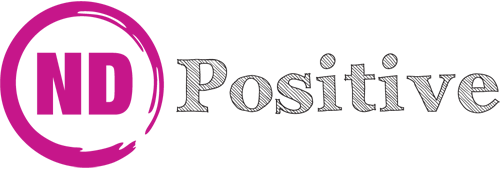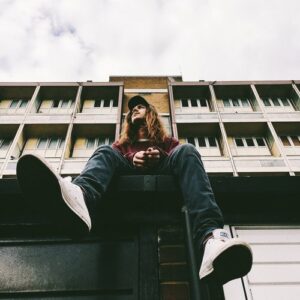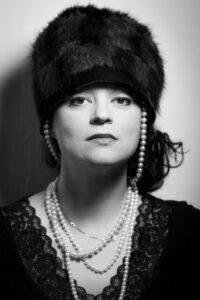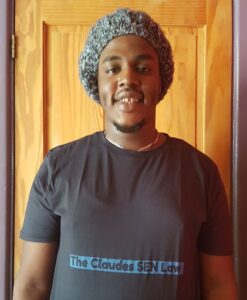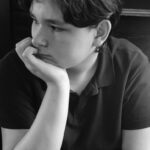Name: Reannon Tapp
ND Type/s: Dyslexia
What do you do: Founder of Hidden Capacities
Where do you live: East of England
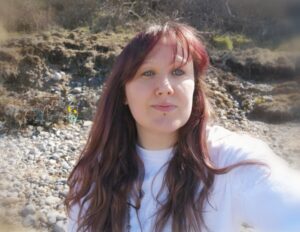
How did you start your day – do you have a morning routine –what do you have for breakfast, do you think a good diet is important?
I prefer waking up naturally in the morning rather than to an alarm – an abrupt start seems to take me a while to flow into, so anything that promotes a natural awakening always seems to get the best out of me. An ND mind has to endure a lot throughout the day, so, yes breakfast is an essential fuel. I would like to say that I’ve nailed a morning routine but that would be a lie. I go through periods of being ultra-conscious about breakfast, eating foods that are great for my brain performance and function, to food being the last thing on my agenda. This is something I need to work on as when I do have a decent breakfast routine, I notice such a difference.
How do you stay active?
I like to mix up what I do to stay active so that I don’t get bored. It is very important to me to not sacrifice my health or wellbeing for my work, or any other aspect of my life. Quads and skateboarding work well for me as they are easy things to do around a busy schedule, especially on days when my time management is poor. I like that I can do these things by myself, and get my introverted down-time needs met. Martial arts, breathwork, movement and dance have also featured a lot throughout my life.
What do you do to relax?
Music is probably my fastest route into relaxing. I also find that writing poetry, sitting under trees, photography, cooking, swimming in the sea, learning German, and connecting with family and friends all help me to relax. I’m also hoping to learn Transcendental Meditation, which might help me to relax more efficiently.
Do you have a favourite word or phrase?
I believe in Hidden Capacities mantras, for example, ‘Be Y-our Extraordinary!’ This relates to how being our authentic ND selves and not masking who we really are can be a difficult journey to reach and sustain. What we choose to share and how we relate to our neurodiversity is unique and needs to be respected. It also refers to the hope that if more people own and feel proud of their true ND self, then more people will hopefully be influenced and a brighter future will be paved for us all.
Another Hidden Capacities mantra is ‘With you in neuro-coexistence’, this acknowledges that so much is changing for our beautiful and vast ND community right now. Attitudes, perceptions, and the language we use are all evolving. This phrase promotes the idea that we will only be able to give these changes real justice if we stand together.
Have you read anything good recently? Is there a book that changed life?
I recently listened to the works of Anita Moorjani – Sensitive Is the New Strong. I’m fascinated by the fact that the gifts of neurodiversity can also bring with them their own unique challenges in society. For example, one of my personal processing gifts is that I experience very high empathy levels. When you’re an empath, prioritising everyone else’s thoughts, feelings and needs over your own can run you down and pull you in too many different directions. Anita’s book has helped me to ensure that being empathetic to the needs of others is no longer at the expense of my own health and well-being.
I’m also fascinated by the works of Mick Collins, author of The Unselfish Spirit & A Visionary Spirit. Mick brings together knowledge from so many disciplines and cultures like a magpie and has this way of synthesising them, even if they are polarised perceptions. Mick challenges how we relate to mental health experiences as well as explore ways our humanity can transform beyond this period of collective chaos and uncertainty.
Which 5 albums will you want to have with you on a desert island?
My music taste is eclectic and committing myself feels difficult… so I have decided to spin this question creatively and cheat, linking artists to my top desert island moments instead.
RavenEye & Greta Van Fleet – for the arrival onto this imaginary island.
Nothing But Thieves & Laura Mvula – for those ‘dance like no one’s watching’ moments.
Alfred Nomad & Chloe Castro – for introverted pauses.
Twenty One Pilots & The Coathangers – for building the momentum to escape and build a raft.
Battle song to keep going – Barbara Dane – ‘I’m on my way’
What is the best piece of advice you’ve ever received and who was it from?
The best piece of timely advice I can think of was written to me in a book when I had consciously decided to stop masking and share my neurodiversity. I was at a vey low point in my life and felt like a failure for not coping with the inaccessible systems and stigma I had come across. The book was Margaret Rookes’ Creative Successful Dyslexic, it contains a lot of collective encouragement but the words my mum had written in the front were ‘Never forget that you can do and achieve anything you want to! So proud of you.’ This encouragement may seem like a small gesture, but I really needed to hear it at the time. It inspired me to create Hidden Capacities, it helped me to keep evolving on my personal ND journey as well encourage me to surround myself with people that do care and embrace me for who I really am.
What do you do now and how did you get into it?
I founded Hidden Capacities, a start-up organisation which continues to evolve. This organisation was born out of both privilege and adversity. The privilege was that I was able to receive neurodiversity coaching from Genius Within as part of a job role. It was the first time I had ever come across a professional with so much specialist ND knowledge (both the difficulties and the gifts). The coach’s level of expertise meant that it felt safe to share my processing gifts and difficulties without fear of being misinterpreted or judged.
In terms of adversity, I have experienced prejudice, pseudo-diagnosis and stigma. I’ve worked with people who are neurodiverse for most of my life, so our collective struggles are something that weighs heavily on me but I’m also very optimistic that, with each passing day, change is coming.
Hidden Capacities wants to ignite people’s interest in what amazing organisations and projects are out there, we offer creative training workshops focused on the subtleties of neurodiversity that are often missed and also provide scholarship awards.
Creativity and thinking differently are often credited to neurodiversity. Would you say that is true? And, if yes, could you give an example?
Processing differently certainly gives a lot of people a natural creative edge, as they already think dynamically, non-linear, pragmatically or visually without even trying. The creative arts and cultural sectors have certainly been a natural sanctum for so many of us as they have valued our differences and contributions for some time. Stephen Wiltshire MBE, springs to my mind when I think about how a person’s ND gifts has inspired many.
When you feel overwhelmed or unfocused, or have lost your focus, what do you do to get back on track? Do you have any hacks, tips or do you use any apps to keep you on track during the day?
I have lots, but these would be my top 6:
1)Transitioning from one environment to another during my working day can aid my concentration and focus tenfold. Since I’ve fully embraced that transitioning to different spaces is important to my well-being and productivity, I have generally achieved a lot more and feel less overwhelmed.
2)Alternating from a standing desk to a seating position when working is also incredibly important for my focus. Within the studio, there are lots of different positions set up so I can transition around the room.
3) I sometimes have to simplify my schedule. This can often make others feel rejected, but it’s purely to avoid everything becoming too much and preventing burnout.
4) Music. I would struggle to function without music in my life.
5) Get back to the basics, sometimes being non-linear in my thought processes means that basic needs such as hydration, sleep etc can get forgotten. If I’m feeling overwhelmed, I can usually track backwards and see where a basic need is out of sync.
6) Asking for help if/when I need it is something that I have become much better at. For example, my partner has very pragmatic thought processes so their natural way of thinking can be a massive benefit to me when I feel overwhelmed. I like how different styles of thought can complement one another.
What makes you happy?
My nephew, anything second-hand and with a story, fearless friends and family, honesty, food, rain, animals, laughter, autumn, water, genuine acts of kindness and freedom.
What has been your biggest achievement so far?
Re-learning to fully be myself based on actual abilities, and not by the definitions or expectations of others. Choosing to no longer mask my neurodivergence has at times been painful but also very liberating.
Does your neurodiversity have an impact on the way you approach relationships?
Yes 100%, I have a tendency to be naturally curious, which means I’m genuinely interested in people, and if you add high levels of empathy to this, it means I can strike up a rapport with others quite quickly. This doesn’t mean that everybody will like me, that certainly isn’t the case, but I find the combination of my ND gifts means I’m good at building genuine relationships with people. It can also have a detrimental impact too, for example, having high empathy can place you in this ‘Cinderella’ archetype with others which can be quite a damaging dynamic. Empaths CAN (not all) have a tendency to prioritise other people’s wants, needs and emotions over their own which can be a very toxic when you are around the wrong people.
Tell us something about your ND experience, that you think not many people will know, or understand?
I also experience Irlen syndrome (also known by many other names, visual stress etc…), the people in my life will be aware that I wear tinted glasses, have a tendency to change the colour of backgrounds and have a preference for increased text size as this stops headaches, fatigue, visual blurs of text and increases my reading speed. What they may not be aware of is that being sensitive to lights, means I also can be affected during my night time routine as much as it can affect me during the day. Discovering the use of an eye mask has massively improved the quality of my sleep.
If given the choice, right now, to start over again – to ND or not ND?
I definitely wouldn’t change this about myself. Sometimes it’s beyond frustrating to be ND, people don’t fully understand the struggles you go through on a daily basis. It can expose you to judgement and misinterpretation. It is statistically harder to survive within education, employment and we are sadly overrepresented within the criminal justice system. To not acknowledge the collective struggle that being ND can bring would be insincere and offensive, but, for me, my ND is my joy. It helps me to see beauty in so much around me, and I think it has helped me to remain positive within all the uncertainty that is going on around us.
Do you have a Positive ND message to the world? Imagine you have a £5 million advertising campaign to spend on billboards all over the world > What would you say?
I love the idea that someone reading all of the ND positive ideas for this question may have the resources or the passion to make some of these ideas a reality one day. So here goes…
“The way the world sees neurodiversity is finally changing. Although all our neuro-differences are hidden, you are never truly alone, you are a part of a wide, dynamic and ever-growing community…”
Final question – where can people find out more about you. Do you have a website and social media pages.
@hidden.capacities – Instagram
@hidden.capacities – Facebook
@wondering_re – Instagram
www.hiddencapacities.org
